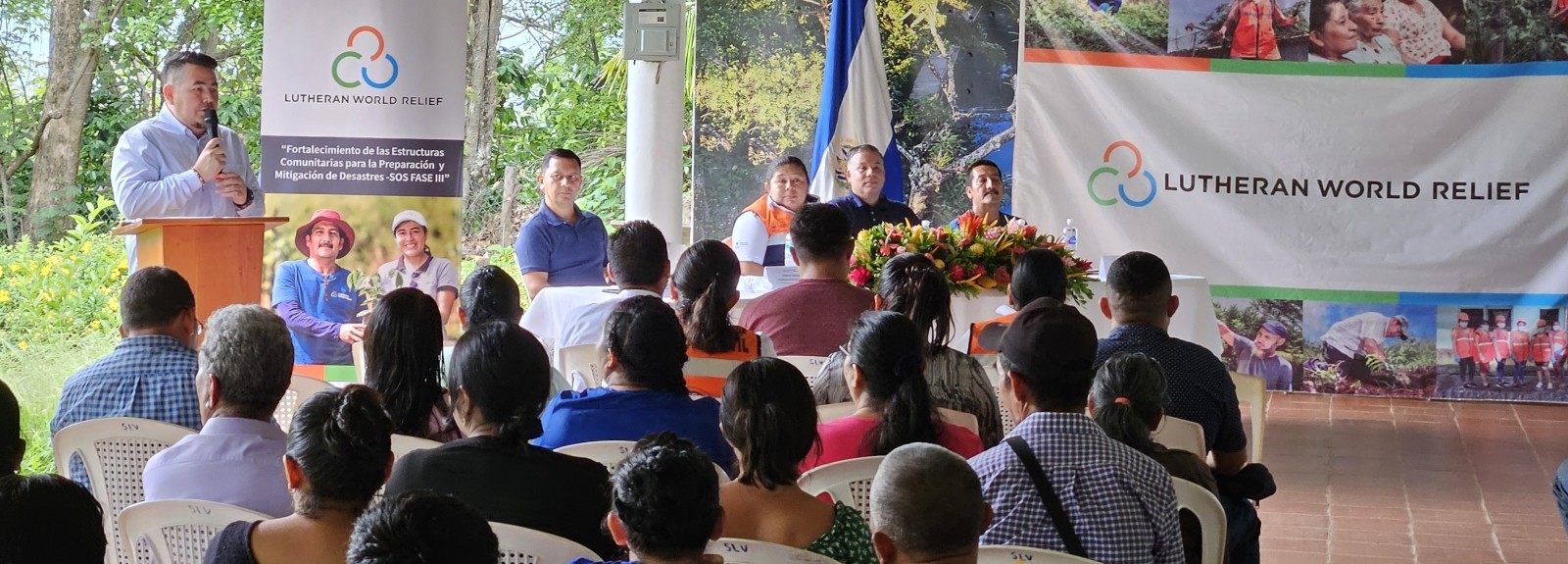La versión en español de este blog está disponible aquí.
Corus organization Lutheran World Relief has officially launched the third phase of its disaster preparedness initiative—Strengthening of Community-Based Structures (SOS)—with community-led events in the departments of Morazán and Usulután. The launch of SOS III marks a major step in a multi-year effort to reduce disaster risk, protect livelihoods and strengthen community resilience in one of El Salvador’s most disaster-affected regions.
The events also served as a platform to share progress from SOS II (2021–2024), celebrating community accomplishments and reaffirming partnerships between local governments, civil society and residents.
Why SOS?
Communities in eastern El Salvador face recurring natural disasters, including storms, floods and droughts. These events continue to threaten lives and livelihoods, especially in rural areas where local disaster structures have historically been under-resourced.
To help close this gap, Lutheran World Relief launched the SOS initiative in 2018 with support from Margaret A. Cargill Philanthropies. Working side by side with local leaders, the initiative helps establish and strengthen disaster committees, known as Communal Civil Protection Commissions (CCPCs), and build systems that allow communities to respond and recover more effectively.
Community members meet with Lutheran World Relief staff regarding potential natural disaster risks in their community of El Pozón, Usulután, El Salvador.
SOS III: Scaling what works
Through SOS I and II, Lutheran World Relief supported the creation and training of 51 Community Civil Protection Committees (CCPCs), developed 868 household and family emergency plans, and launched more than 1,300 community action plans. These structures have played a critical role in protecting households from environmental shocks. For example, when Hurricane Julia struck the region in 2022, these systems reached nearly 14,000 people with timely support, demonstrating the life-saving impact of locally driven preparedness.
The third phase of the SOS initiative builds on these years of progress, expanding efforts into 25 new communities across Morazán and Usulután.
Shaped by a participatory planning process, SOS III reflects the priorities voiced by local leaders, residents and partner organizations. In early planning sessions, participants emphasized the importance of strong early warning systems, improved infrastructure and closer coordination with government services. Their feedback was not only heard, it was used to guide the project’s design.
Local governments have offered logistical support and community meeting spaces. Community members have committed to volunteering their time and expertise. NGOs and civil society partners have pledged to align efforts and share resources. This collective readiness reflects the spirit of SOS III: a locally led effort strengthened by shared commitment and sustained collaboration.
Over the next three years, SOS III will:
- Expand coverage from 51 to 76 communities across 10 municipalities.
- Consolidate a watershed-based approach to disaster and environmental management.
- Empower women, youth, and vulnerable populations to lead local resilience efforts.
- Protect household livelihoods through savings groups and sustainable income strategies.
- Strengthen partnerships with government agencies, universities, and civil society to ensure systemic impact.
As one community leader shared:
“This is not just a project. It’s a shared commitment to the well-being of our families, our lands and our future.”
SOS III is designed not only to reduce disaster risks—but to ensure that the people closest to those risks are at the forefront of the solutions.
Members of the SOS III project team speak about the importance of reducing community disaster risk at the project launch event in Morazán, El Salvador.
A participatory launch
The project officially launched on May 20 in Morazán and May 22 in Usulután, bringing together 189 participants, including community leaders, local authorities and members of the National Civil Protection System. The launch events featured risk-awareness dramatizations, presentations of SOS II achievements and video stories from participating communities. Attendees engaged in open discussions and shared ideas for the road ahead. These events reflected the core of SOS III: a participatory, community-driven approach to disaster preparedness that centers local knowledge and long-term leadership.
Looking ahead
Over the next three years, SOS III will continue investing in local structures that make communities safer, more responsive and better equipped to manage disasters. The goal is not just to prepare for the next emergency, but to support communities in leading their own solutions well into the future.
Through collaboration, practical training and shared leadership, Lutheran World Relief and its partners reaffirm their belief that lasting resilience begins locally—and that real change happens when communities lead the way.
Learn More
Catch highlights and community interviews from regional stations that covered the SOS III launch events:
- Morazán TV Nuestro Canal - Watch La Noticia del Pueblo (starts at 6:55)
- TVO Noticias - Watch coverage from Morazán (starts at 24:13)
- Canal 14 TLM – Watch coverage
- TV Impacto Canal 77 – Usulután - Watch coverage
- Canal 15 – Usulután - Watch segment (starts at 39:55)
- TVO Canal 23 – Noticia - Watch full news coverage (starts at 33:50)
Contact
For more information about SOS III or to explore partnership opportunities, please contact Karen Pavon, Director for Central America, at @email.

